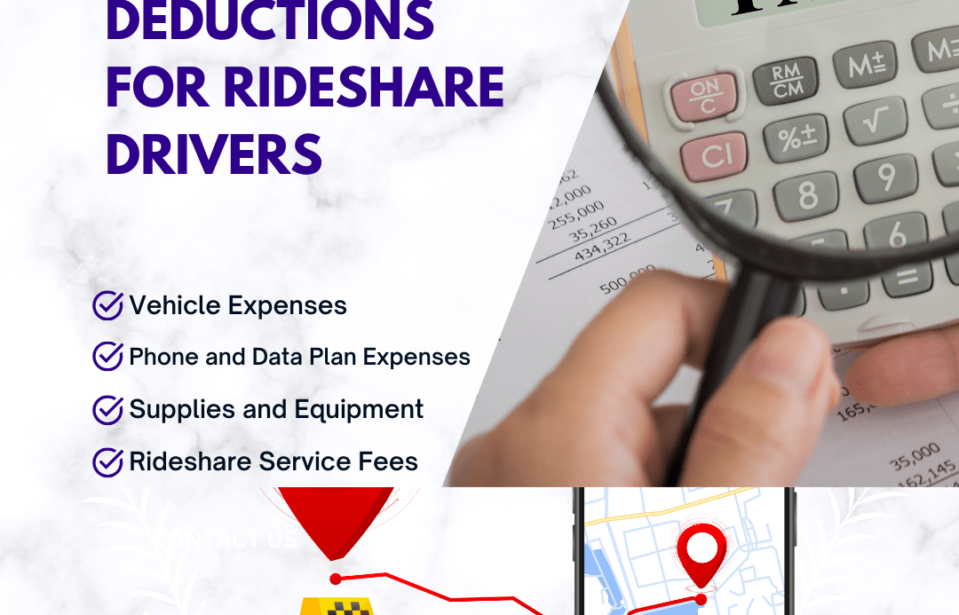As a rideshare driver, you’re likely always looking for ways to boost your earnings. Did you know that you may be eligible for a range of tax deductions that can significantly impact your bottom line? By understanding and taking advantage of these deductions, you can maximize your profits and keep more of your hard-earned money. In this comprehensive guide, we will cover everything you need to know about tax deductions for rideshare drivers, from common expenses to tracking and claiming them on your tax return.
Now, let’s dive into the world of tax deductions and explore how you can make the most of them as a rideshare driver.
List of Tax Deductions for Rideshare Drivers:
- Vehicle Expenses
- Phone and Data Plan Expenses
- Tolls and Parking Fees
- Car Maintenance and Repairs
- Car Cleaning and Detailing
- License and Registration Fees
- Rideshare Service Fees
- Health and Wellness Expenses
- Supplies and Equipment
- Food and Entertainment Expenses
Understanding Each Deduction and Record-Keeping Tips:
1. Vehicle Expenses:
As a rideshare driver, your vehicle is your mobile office, so it’s important to maximize your deductions in this category. You have two options for claiming vehicle expenses:
- Standard Mileage Deduction: The IRS sets a standard mileage rate annually, which simplifies the deduction process. For 2023, the rate is $0.66 per mile for business use. Simply track your mileage using a mileage-tracking app or logbook, and multiply your total business miles by the standard rate.
- Actual Expenses: Alternatively, you can deduct the actual costs associated with operating your vehicle. This includes gas, maintenance, repairs, insurance, registration fees, and depreciation. Keep detailed records and receipts for all vehicle-related expenses, and consult with a tax professional to determine the most advantageous approach.
2. Phone and Data Plan Expenses:
Your phone is an essential tool for your rideshare business, so you can deduct a portion of your phone and data plan expenses based on business use. Calculate the percentage of business use and apply it to your total phone and data plan costs. Be sure to keep your phone bills and track data usage specifically related to ridesharing activities.
3. Tolls and Parking Fees:
Tolls and parking fees incurred while driving for rideshare services are deductible. Keep toll receipts when applicable, or consider using a toll transponder linked to your rideshare account for accurate tracking. If you incur parking fees while waiting for ride requests, be sure to save those receipts as well.
4. Car Maintenance and Repairs:
Expenses for car maintenance, such as oil changes, tire rotations, brake repairs, and more, are deductible. Keep detailed records of your maintenance and repair services, including receipts and mileage logs, to differentiate between personal and business use.
5. Car Cleaning and Detailing:
Providing a clean and comfortable ride for your passengers is essential. You can deduct expenses for car washes, interior cleaning, and detailing services. Keep these expenses separate and easily identifiable by saving the relevant receipts or using expense-tracking software.
6. License and Registration Fees:
The costs of obtaining or renewing your driver’s license and vehicle registration are deductible. These fees vary by state and vehicle type, so keep copies of these documents and any associated receipts for proof of expenses.
7. Rideshare Service Fees:
The fees charged by rideshare companies, such as Uber or Lyft, for using their platforms are deductible. This includes commissions, booking fees, and other charges outlined in your annual tax summary. These fees are typically reported on a 1099-K form, but it’s important to cross-reference this with your own records to ensure accuracy.
8. Health and Wellness Expenses:
As a rideshare driver, your health and well-being are crucial. You can deduct expenses for items like ergonomic seat cushions, back support, hand sanitizer, face masks, or other wellness products necessary for your work. Keep receipts and consult with a tax professional to understand the specific qualifications for these deductions.
9. Supplies and Equipment:
Any supplies or equipment specifically purchased for your rideshare business are deductible. This includes phone mounts, dash cams, signage, snacks or refreshments for riders, and promotional items. Be sure to keep receipts for these purchases, as they can add up and provide significant tax savings.
10. Food and Entertainment Expenses:
The IRS allows for deductions related to meals and entertainment. As a rideshare driver, you may incur food expenses while on the job, such as purchasing snacks or meals during long shifts. You can deduct a portion of these expenses based on the percentage of business use. Keep detailed records and receipts to support these deductions and ensure compliance with IRS regulations.
Record-Keeping Tips for Proof of Expenses:
- Mileage Tracking: Use a mileage-tracking app or logbook to record the number of miles driven for business purposes. This is essential for claiming the standard mileage deduction or differentiating between personal and business use for actual expense deductions.
- Receipt Management: Save and organize all expense receipts, either physically or digitally. Scan or photograph receipts and store them in a dedicated folder for easy access during tax season.
- Expense-Tracking Apps: Utilize expense-tracking apps specifically designed for self-employed individuals or rideshare drivers. These apps can help you categorize expenses, capture receipts, and generate reports, making tax preparation more efficient.
- Separate Business and Personal Expenses: Open a separate bank account or obtain a business credit card specifically for your rideshare business. This clear separation will make it easier to track and prove your business-related expenses.
Maximizing Your Deductions and Consulting a Tax Professional:
To ensure you’re maximizing your tax deductions, consider the following:
- Stay Organized: Maintain accurate and up-to-date records throughout the year. Regularly update your expense logs and mileage trackers to avoid last-minute scrambling during tax season.
- Understand Deduction Limits: Certain deductions may have limits set by the IRS. For example, meals and entertainment expenses are typically limited to 50% of the total expense. Stay informed about these limits to ensure compliance and avoid potential issues.
- Consult a Tax Expert: Consider seeking advice from a tax professional familiar with the rideshare industry. They can provide personalized guidance, ensure you’re taking advantage of all applicable deductions, and help you navigate any complex situations.
Understanding and effectively managing your tax expenses as a rideshare driver is a key component of financial success. By familiarizing yourself with the available deductions, maintaining thorough records, and seeking expert advice when needed, you can maximize your earnings and feel confident come tax season. Remember, proper tax planning is a year-round commitment that pays off when it’s time to file your taxes.
Join our buzzing community of rideshare drivers where you can connect with your fellow drivers and discuss any questions or insights you may have about the rideshare world. Whether you’re a seasoned driver or just starting, our community is a space to share experiences, seek advice, and find support from those who understand the unique challenges and joys of being a rideshare driver.





Leave a comment